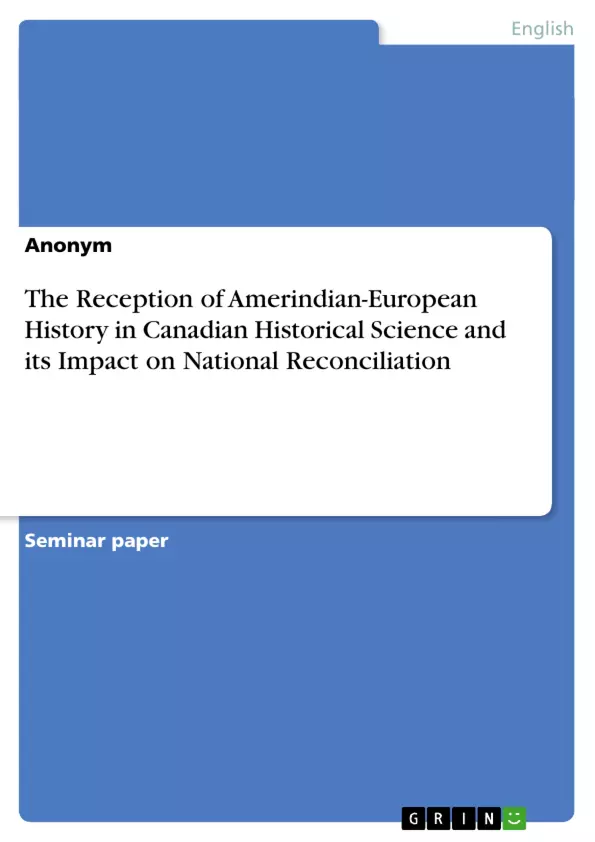[...] A hint to answer this important question gives us the literature about historical injustice. The basic assumption of this literature is that unresolved historical injustice often continues to effect the present day and that a process of societal reconciliation must take place in addition to political attempts to remedy social inequalities. This seems to be highly relevant for the situation of the native-majority relations in Canada, because this relation is undoubtedly marked by the historical injustice committed against the Native Peoples. The assumptions put forward in this essay are that the work of social historians is of great importance to prepare the grounds for such reconciliation processes and, moreover, that their work mirrors the ability of a society to confront itself with its own history. This is where historiography comes in: their presentation of the historic facts is the basis of how a society constructs its own history. Without a thorough historical examination of the historical injustice, this injustice will not exist in the minds of the population and therefore cannot even enter the discourse. Historians’ work serves as the starting point for a societal awareness which will ideally lead to the reconciliation or even compensation of the historical injustice done to Canada’s Native Peoples. From this follows the structure of this essay: I will firstly discuss some theoretical core ideas about historical injustice and shortly present the historical setting for the empirical analysis. The following empirical part encompasses an examination of Canadian historian writings about the Native Peoples. More specifically, I will compare older literature from the late 1960s with more recent literature, from the late 1980s onwards, to examine whether the presentation of native Canadians in historical writing has changed and to discuss the extent to which this literature contributes to reconciliation.
Inhaltsverzeichnis (Table of Contents)
- Introductory Part
- Context
- Theoretical Background
- Historical Background
- Main Part
- Fur Trade
- Christianization
- Epidemic
- Land Rights
Zielsetzung und Themenschwerpunkte (Objectives and Key Themes)
This essay explores the reception of Amerindian-European history in Canadian historical science and its impact on national reconciliation. It examines the extent to which historical writings have contributed to a more nuanced understanding of the past and its impact on the present, ultimately focusing on the potential of history to facilitate a process of societal reconciliation.
- Historical Injustice and its Impact on Present-Day Society
- The Representation of Native Peoples in Canadian Historical Writings
- The Role of Historiography in Promoting Societal Reconciliation
- The Interplay of Cultural Differences and Land Rights in the Canadian Context
- The Importance of Addressing Historical Injustice for Achieving Distributive Justice
Zusammenfassung der Kapitel (Chapter Summaries)
The introductory part sets the stage by discussing the significance of historical injustice in shaping contemporary social and political realities. It explores the theoretical framework of historical injustice, drawing on Kant's principles of international relations and Waldron's arguments about the complexities of addressing historical wrongs. The historical background then provides a brief overview of the arrival of Europeans in Canada and its impact on the indigenous population, highlighting the devastating effects of diseases and land dispossession.
Schlüsselwörter (Keywords)
This essay delves into the crucial topics of historical injustice, national reconciliation, Canadian historical science, the representation of Native Peoples, historiography, land rights, cultural differences, and the relationship between the past and the present in shaping societal dynamics.
Frequently Asked Questions
What is the relationship between historical injustice and national reconciliation in Canada?
Unresolved historical injustices against Native Peoples continue to affect the present; societal reconciliation is necessary to remedy social inequalities and move forward.
How does historiography impact societal awareness of injustice?
Historiography provides the factual basis for how a society constructs its history. Without a thorough examination by historians, injustices may not enter public discourse or the minds of the population.
How has the representation of Native Canadians in literature changed since the 1960s?
The essay compares older literature (late 1960s) with more recent writings (late 1980s onwards) to see if historians have developed a more nuanced and accurate portrayal of indigenous history.
What are the key historical areas analyzed in the empirical part?
The analysis focuses on the fur trade, Christianization, epidemics, and land rights as central points of Amerindian-European contact.
What theoretical ideas are discussed regarding historical wrongs?
The text draws on Kant’s principles of international relations and Waldron’s arguments about the complexities of addressing and compensating for historical injustices.
- Quote paper
- Anonym (Author), 2004, The Reception of Amerindian-European History in Canadian Historical Science and its Impact on National Reconciliation, Munich, GRIN Verlag, https://www.grin.com/document/39598



